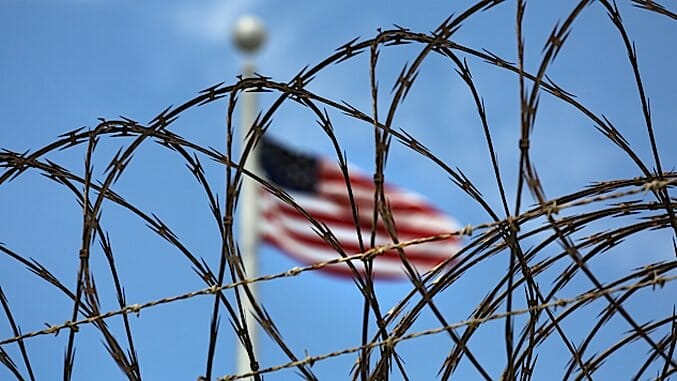America’s Private Prisons Are Nothing Less Than a System of Modern Slavery
Photo by John Moore/Getty
On Sep. 9 this year, an estimated 24,000 inmates in as many as 29 prisons around the United States refused to report to their jobs, protesting the abhorrent conditions in which prisoners often toil thanklessly in fields or warehouses for as little as 12 cents an hour. A month later, the strike—which was timed to coincide with the 45th anniversary of the Attica prison uprising—has largely ended. And despite the fact that tens of thousands of inmates managed to reasonably and peacefully protest what are clearly deplorable circumstances (and were even joined in their protest by guards at a penitentiary in Alabama, the state where the protest originated), hardly a word has been written about the protests in the mainstream media.
As we’ve written in these pages, the reasons for the media blackout of such a compelling story are simple and profit driven: The likes of AT&T, McDonald’s, Walmart and Verizon would rather not have the general public know just how much they profit from prison labor. As the prison population began to soar exponentially in the 1970s (it grew by 700 percent from 1970 to 2005) businesses began petitioning lawmakers to lift restrictions on inmate labor that had been on the books since the 19th century. A 1979 program enacted by Congress began incentivising private companies to use inmate labor, and draconian drug and sentencing policies began flooding our privately owned and for-profit prisons with inmates. Twenty-five years later, the annual profits from the program have soared to an astonishing $472 million (2015 numbers), a mere five percent of which went to the inmates doing the work.
International Incarcerated Workers Organizing Committee (IIWOC) spokeswoman Azzurra Crispino recently described the protest’s motivations to The New Yorker, “The idea was, let’s have a work stoppage as a way of denying economic benefit to corporations… If prisoners were paid a minimum wage, we know perfectly well that we could not afford to incarcerate the number of people we do in this country.”
A nearly $500 million dollar industry is essentially not paying its laborers, nor is it allowing them to unionize, all while keeping them in dehumanizing living conditions that the workers are powerless to change. Consider that incarceration rates disproportionately impact men of color: one in every 15 African American men and one in every 36 Hispanic men are incarcerated in comparison to one in every 106 white men. From the Republican party’s preposterous war on drugs to Bill Clinton’s crime bill, black males—and their families—have suffered more than anyone, and they have suffered immeasurably. To add the additional indignity of working in a hellhole like Angola for a mere pittance is unjustifiable and inhumane. It is equally unjustifiable to deny the notion that the 13th amendment’s so-called loophole, which abolished slavery except as “punishment of crime,” is exactly what is occurring in 2016: Modern slavery.
-

-

-

-

-

-

-

-

-

-

-

-

-

-

-

-

-

-

-

-

-

-

-

-

-

-

-

-

-

-

-

-

-

-

-

-

-

-

-

-








































